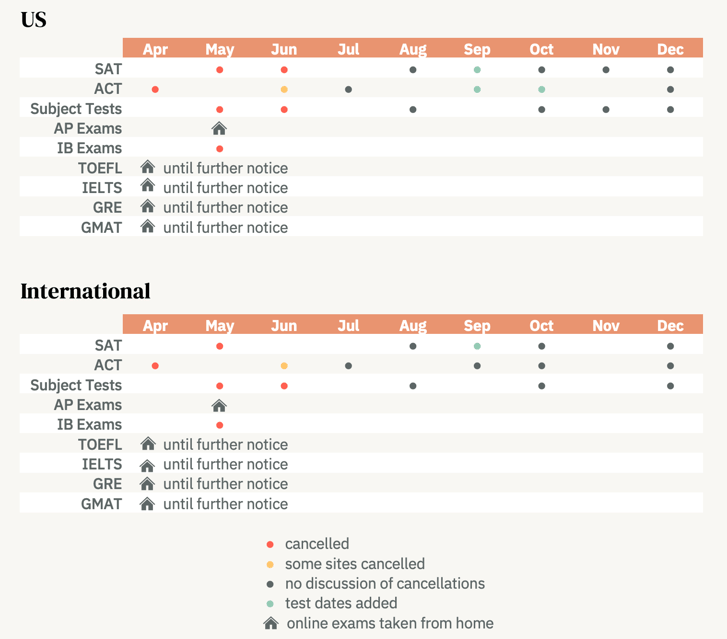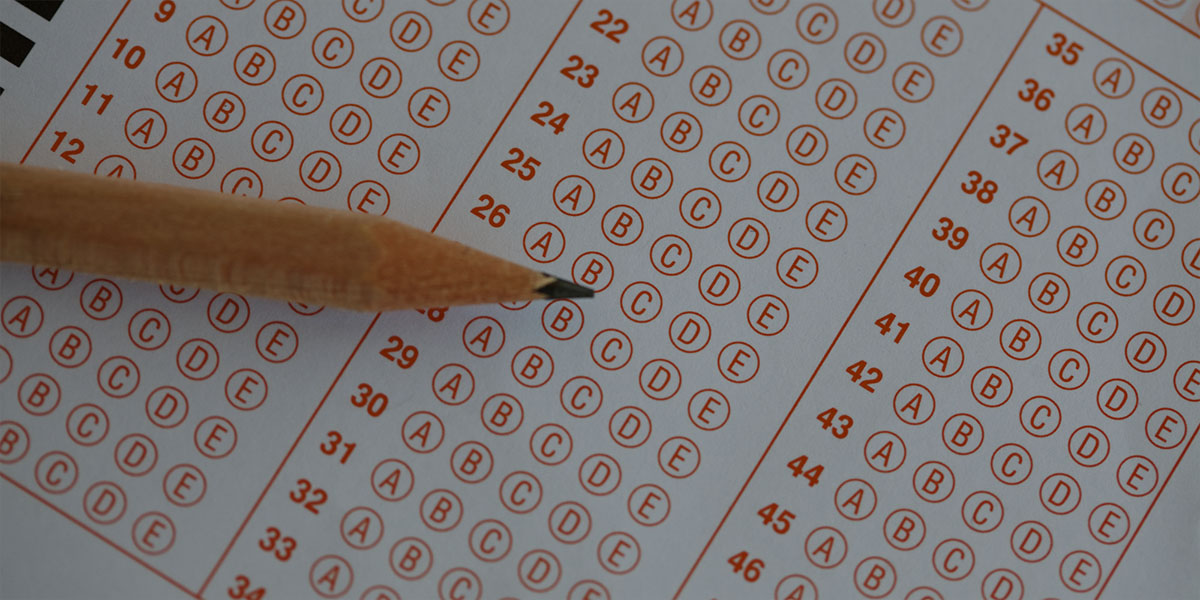For more, check out our full Coronavirus Resource Library at this link.
Updated 6/24/20
For the first time in history, the ACT and SAT have cancelled exams en masse. AP exams were taken online from students' homes. Subject Tests have been hit, too. Many students, parents, and counselors are coming to us with the same question: My test was cancelled. What should I do?
Below is our advice on what to do if your exams are cancelled, rescheduled, or modified due to coronavirus.
Which Tests Have Been Cancelled updated 6/24/20
A lot will change over the next few weeks and months, but here’s a quick rundown of cancelled and modified exams.

These charts will certainly change. We’ll be keeping this chart updated as we learn more.
Class of 2021 U.S. Students: What To Do Next
ACT
- Which tests? Prepare for one of the September testing dates in the likely event of a July cancellation in your area. ACT recently announced additional test dates for the fall, and registration opens the last week of July.
- How to prep? Students who can should continue preparation as they have been. For most that’s about 4–5 hours of studying per week: a mix of practice exams, tutoring, independent study, etc. For students who can’t maintain that pace, we recommend cutting back slightly for the next few weeks, then returning to the normal pace no later than late July.
- Why this plan? There’s still a strong likelihood that a large number of individual test sites will be closed in July. September is a safer bet, and you can take advantage of the extra prep time while stressing less about whether your exam will be cancelled. Once school restarts, the academic pace will be intense as teachers try to catch up on missed time. You don’t want to be dealing with that stress and cramming for the ACT at the same time.
SAT
- Which tests? Plan for whichever fall date(s) have available seats in your area. Try to register for August or September, with October and/or November as back-ups.
- How to prep? If you are aiming for August, continue your preparation as you have been. For most that’s about 4–5 hours of studying per week: a mix of practice exams, tutoring, independent study, etc. If you are aiming for September or later, we recommend cutting back or taking a break for the next few weeks, then returning to the normal pace by late July.
- Why this plan? You don’t want to lose all the ground you’ve gained preparing for cancelled test dates but also don't want to burn out. Depending on where you are in your test prep journey, prepping at a slower pace or taking a short break may help you maximize retention and avoid burnout between now and the official exam.
Subject Tests
- Which tests? Speak with your counselor about how to prioritize the upcoming test dates. Many students will likely want to focus on the general SAT in August, leaving October as the next opportunity for SAT Subject Tests.
- Before you decide: Students who have been planning on taking the SAT Subject Tests need to ask their counselors if they should continue to pursue Subject Tests.
- How to prep? If your counselor says you do still need to pursue Subject Tests, you will want to begin reviewing course material 6-8 weeks before your Subject Tests in the summer or fall. You may need to ramp up your Subject Test prep, likely up to 6-8 hours of studying per week: a mix of practice exams, tutoring, independent study, etc.
- Why this plan? Moving school online means students are going to miss crucial pieces of the curriculum needed for the exam, and extra preparation will be necessary to fill in those gaps. Additionally, October may very well be the only time a student will be able to take the Subject Tests before Early Decision deadlines, as earlier test dates will need to be saved for SAT or ACT testing, so it is more important than ever to do well the first time.
Class of 2021 International Students: What To Do Next
ACT
- Which tests? International students’ testing options are still the most dependent on when social distancing ends, so register when you can. Plan for September with October as a back-up.
- How to prep? Students who can should continue preparation as they have been. For most that’s about 4–5 hours of studying per week: a mix of practice exams, tutoring, independent study, etc. For students who can’t maintain that pace, we recommend cutting back slightly for the next few weeks, then returning to the normal pace by late July.
- Why this plan? There’s still a strong likelihood that a large number of individual test sites will be closed in July. September is a safer bet, and you can take advantage of the extra prep time while stressing less about whether your exam will be cancelled. Once school restarts, the academic pace will be intense as teachers try to catch up on missed time. You don’t want to be dealing with that stress and cramming for the ACT at the same time.
SAT
- Which tests? Plan for whichever fall date(s) have available seats in your area. Try to register for August or September, with October as a back-up.
- How to prep? If you are aiming for August, continue your preparation as you have been. For most that’s about 4–5 hours of studying per week: a mix of practice exams, tutoring, independent study, etc. If you are aiming for September or later, we recommend cutting back or taking a break for the next few weeks, then returning to the normal pace by late July.
- Why this plan? You don’t want to lose all the ground you’ve gained preparing for cancelled test dates but also don't want to burn out. Depending on where you are in your test prep journey, prepping at a slower pace or taking a short break may help you maximize retention and avoid burnout between now and the official exam.
Subject Tests
- Which tests? Speak with your counselor about how to prioritize the upcoming test dates. Many students will likely want to focus on the general SAT in August, leaving October as the next opportunity for SAT Subject Tests.
- Before you decide: Students who have been planning on taking the SAT Subject Tests need to ask their counselors if they should continue to pursue Subject Tests.
- How to prep? If your counselor says you do still need to pursue Subject Tests, you will want to begin reviewing course material 6-8 weeks before your Subject Tests in the summer or fall. You may need to ramp up your Subject Test prep, likely up to 6-8 hours of studying per week: a mix of practice exams, tutoring, independent study, etc.
- Why this plan? Moving school online means students are going to miss crucial pieces of the curriculum needed for the exam, and extra preparation will be necessary to fill in those gaps. Additionally, October may very well be the only time a student will be able to take the Subject Tests before Early Decision deadlines, as earlier test dates will need to be saved for SAT or ACT testing, so it is more important than ever to do well the first time.
Class of 2022
Because you have time, your situation’s a bit different. You may want to consider starting the early phases of test prep ahead of schedule. You can take advantage of this slow time while school is out and do foundational work. That way when school ramps back up (and it’s likely to be pretty busy), you’ve got some of your prep steps out of the way.
But that doesn’t mean going all in and starting test prep full force. Instead, we recommend using this time for:
- Taking ACT and SAT diagnostics to choose the exam you will prepare for next year.
- Comparing prep options available to you and picking how you will prep when the time comes next year.
- Working on foundational skills for the Reading section of the test. These skills (like reading speed, analysis skills, and reading charts and graphs) take the longest to learn. Getting a head start will make your test prep faster in next year—and even help in school. You can start by using our Recommended Reading List here or reach out to our experts here for more specific lessons.
AP Exams for All Students updated 4/22/20
The College Board announced that AP exams will be delivered online, and all students will take these tests at home. Every test will be limited to 45 minutes. The multiple-choice portion of all tests will be cut, and the exams will be open note.
There are two AP testing windows: May 11-22 and June 1-5. With that said, all students should plan for the May testing window, barring extenuating circumstances, and treat the June testing window as a "make-up" window only.
- If you miss the May exams for any reason, such as illness or tech issues, you’ll still have June as a back-up plan.
- It would be a huge risk to bank on June alone. Even if June students experience tech issues that prevent them from submitting their answers, no further make-up dates will be offered.
- You’ll perform your best while the material is fresh. This year’s AP exams will include only the content that is covered by most teachers through early March. The sooner you take your exam, the more recently you’ll have learned and studied the material you’re being tested on.
Students should review our blog posts on the exams' format and question structure and how to prepare for an open note exam. Students who receive accommodations can also review the College Board's website for details about using their approved accommodations for this year's exams.
In late April, we'll post more information about how to prepare for the online test interface.
IB Exams for All Students updated 4/19/20
IB exams for spring 2020 have been cancelled worldwide. Instead, students' marks will focus solely on coursework components and their predicted grades. Students will still be awarded IB diplomas and certificates for the May session, but the assessment process will require schools to submit students' coursework to be externally marked by the IB.
For now, students should continue to focus on the units and coursework their teachers assign, keeping in mind this coursework now holds greater weight. And ask for help if you are struggling to make the transition to online learning.
Need more individualized advice?
The recommendations above are generalized plans. If you have specific questions or want a personalized plan, reach out to our experts here. We’re happy to help in any way we can.
ArborBridge is hard at work tracking the latest developments. We’ll be updating this post as new information, test dates, and cancellations are announced.






